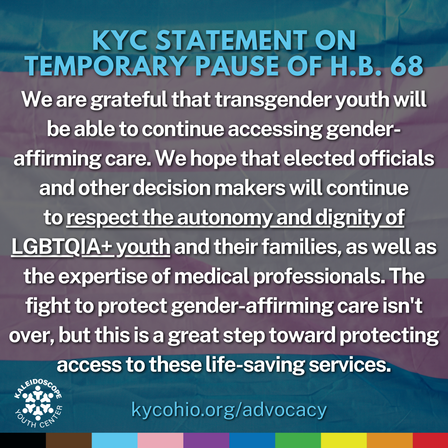An Update on Access to Gender-Affirming Care in Ohio
|
On April 16, a Franklin County judge temporarily blocked H.B. 68 from taking effect. This means that, for the time being, transgender youth will be able to continue accessing gender-affirming care AND transgender women and girls can continue to play school sports on the teams that align with their gender identity.
The temporary restraining order is in effect until July 16, 2024. We will continue to provide updates as they become available. In the meantime, check out the ACLU of Ohio's website for more information about the lawsuit. |
Legislation we're watching:
Ohio House Bill 8Ohio House Bill 8 could lead to teachers and other school personnel having to out students to their families. It would also require schools to notify parents prior to the instruction of "sexuality content."
H. B. 8 was voted out of the Ohio House of Representatives on June 21, 2023. It now moves to the Ohio Senate, where it was assigned to the Education Committee. Contact members of the committee and tell them to vote NO on House Bill 8. |
|
Ohio House Bill 245Ohio House Bill 245 would ban drag performances in public spaces that are not adult-only, including parks, parades, libraries, theater performances and more. The bill also bans performances from those who exhibit a gender identity different from the sex they were assigned at birth, directly targeting any transgender or gender nonconforming individual in the public eye.
H.B. 245 has been introduced in the Ohio House and is assigned to the House Criminal Justice Committee. Contact members of the committee and tell him to not move this bill forward. |
Ohio House Bill 183Ohio House Bill 183 is a discriminatory bill that would prohibit transgender students at the K-12 and college levels from using the bathroom, locker room, changing facility or housing accommodation that aligns with their gender identity. Trans students would be required to use the restroom that aligns with the sex they were assigned at birth. The bill does not prohibit the use of single-stall/gender-neutral facilities.
H.B. 183 has been introduced in the Ohio House and is currently in the Ohio House Higher Education Committee. Contact members of the committee and tell them to reject Ohio House Bill 183. |
Ohio House Bill 220Ohio House Bill 220 would prohibit certain health care professionals, including physicians, psychologists and mental health counselors, from subjecting minors to conversion therapy. Conversion therapy is the forceful and disproven practice of seeking to change one's sexual orientation or gender identity and expression.
H.B. 220 has been introduced in the Ohio House and is currently in the Ohio House Public Health Policy Committee. It has not yet had a hearing. Contact Committee Chair Rep. Scott Lipps and tell him to hold a hearing on the bill, and contact members of the committee and tell them to pass H.B. 220. |
Ohio Senate Bill 132The Ohio Fairness Act would prohibit discrimination on the basis of one's sexual orientation or gender identity and expression. These protections would apply in housing, employment and other public accommodations.
Senate Bill 132 has been introduced in the Ohio Senate and is assigned to the Government Oversight and Reform Committee. Contact members of the committee and tell them to pass the Ohio Fairness Act. |
Want to testify?
Anyone, even those who aren't old enough to register to vote, can submit written testimony or testify in-person on a bill.
Regardless of which method you choose, here's what you need to know:
Please note: Both written and in-person testimony is considered a public record, meaning your name and remarks are available for anyone to read. If you're a young person interested in testifying but don't want your name attached for safety or privacy reasons, email [email protected] to have your comments included anonymously in future KYC testimony.
- Written testimony consists of remarks that you submit that show up on the website and that legislators can read on their own time.
- In-person testimony consists of remarks that you deliver as a speech in front of the committee during a scheduled hearing.
Regardless of which method you choose, here's what you need to know:
- In-person testimony is generally limited to five minutes, while written testimony can be any length.
- You'll have to include a completed witness form, saved as a PDF. You can find the form here.
- You don't have to use your legal name when submitting testimony! Preferred names (and even pseudonyms) are just fine. Also, feel free to use KYC's address (603 E. Town Street Columbus, OH 43215) if you don't feel comfortable using your own.
- Email your testimony and witness form to the chair of the committee. You can find that contact information at www.ohiohouse.gov/committees or www.ohiosenate.gov/committees.
- IMPORTANT: Testimony is due 24 hours before the scheduled start of the committee hearing.
Please note: Both written and in-person testimony is considered a public record, meaning your name and remarks are available for anyone to read. If you're a young person interested in testifying but don't want your name attached for safety or privacy reasons, email [email protected] to have your comments included anonymously in future KYC testimony.
|
Listen to Speaking Queerly
KYC has a podcst!
Join Mallory Golski (she/her), Isiah Harris (he/they), Daria Johansen (she/her) and Lane Shirrell (they/them) as they explore topics related to the LGBTQIA+ community, including current events, legislation, pop culture and intersectionality. Have a question you want answered or a topic you’d like discussed on Speaking Queerly? Email [email protected]. |
Get InvolvedThe Queer Advocacy Coalition (QAC) is a partnership between Kaleidoscope Youth Center and Equality Ohio that seeks to mobilize LGBTQ+ Ohioans and their allies to advocate for legal and lived equality in Ohio and fight against the harmful marginalization of LGBTQIA+ people.
All LGBTQIA+ Ohioans and allies are encouraged to join to learn more about current LGBTQIA+ related legislation and policy priorities, hear from guest speakers and cultivate loving and authentic advocacy and community outreach. Email [email protected] to learn more and to register for the next meeting. |
Your Vote MattersLocal elections are important in helping to build safer and more affirming spaces in our communities.
|






















